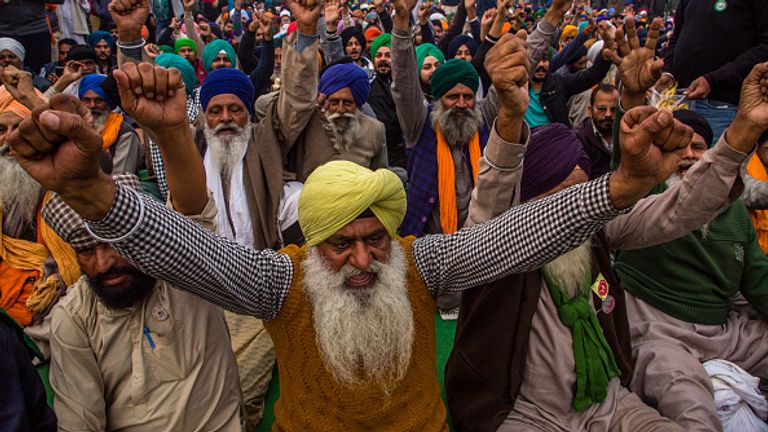Home » World News »
Why are farmers in India protesting?
More than half of India’s 1.3 billion population work on farms, but agriculture contributes to only about a sixth of the country’s gross domestic product.
Agricultural reforms are needed in the country but the issue is tough to handle.
Smallholdings, shrinking productivity, the increasing cost of living and lack of modernisation have had a stranglehold on this sector. The government distributes large subsidies to keep things under control.
Why are there protests in India?
Farmers have been protesting against three farm laws published by the government under Prime Minister Narendra Modi. They want the laws scrapped.
The protests have mainly been led by farmers from Punjab and Haryana, but now thousands are joining in from other parts of the country, particularly from western Uttar Pradesh.
The Supreme Court of India has suspended the implementation of the laws and constituted a committee. The executive cannot proceed with the implementation of the laws yet.
What will India’s new farming rules do?
The Farmers’ Produce Trade and Commerce (Promotion and Facilitation) Act allows farmers to sell their produce outside the Agriculture Produce Markets Committees (APMC). This means traders can purchase from a farmer at a mutually agreed price.
The Farmers (Empowerment and Protection) Agreement of Price Assurance and Farm Services Act allows farmers to do contract farming and market their produce freely.
The Essential Commodities (Amendment) Act removes food grains, pulses, edible oils and onion from the essential list and makes it unrestricted for trade except in extraordinary circumstance.
What are farmers saying?
Farmers say the laws will deregulate crop pricing and eventually get rid of the Minimum Support Price (MSP) that guarantees them an income by setting a uniform price for the crop.
Most farmers are small-scale and have low annual incomes. They are in no position to take their produce out of their district to trade. It will also add to their expenses.
They believe in the long run a consortium of private players will develop, leaving them vulnerable to large corporations and market forces.
The dispute mechanism does not allow them to go to court. Instead, it will be brought before a bureaucrat, who the farmers believe will most likely favour big business. The laws are not supported by sufficient regulation, they argue.
How does this affect people in the UK?
There is a very large diaspora from Punjab living in the UK with farming backgrounds and there are very close ties with family and friends back home.
More than 100 UK MPs across party lines have urged Prime Minister Boris Johnson to take up the issue with his Indian counterpart and to press for a “speedy resolution of the current deadlock and democratic human rights of citizens to peacefully protest”.
Source: Read Full Article






